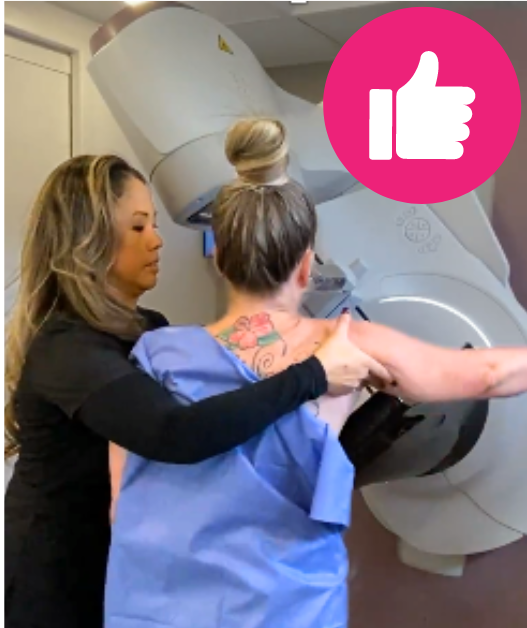Our Resources
Below are resources to support mammography technologists and their breast imaging departments. Find information on mammography accreditation, positioning techniques and problem-solving, regulatory requirements, breast cancer support and much more.

Mammography Positioning

by Louise C. Miller, RTRM, FSBI
Series by Robyn Hadley, RTRM & Sarah Jacobs, R.T.(R)(M)(CT)
Series by Louise C. Miller, RTRM, FSBI: Part 1 of 3
Series by Louise C. Miller RTRM, FSBI: Part 2 of 3
Series by Louise C. Miller RTRM, FSBI: Part 3 of 3
Source: Billings Gazette covers Montana's Billings Clinic Breast Center's experience with the Train-the-Trainer Program and the importance of standardized mammography positioning.
This study evaluates to what extent technologists’ experience, training, or practice in mammography are associated with screening mammography positioning quality.
by Louise C. Miller, RTRM, FSBI
by Dawn Derenburger, RTRM & Robyn Hadley, RTRM
by Dawn Derenburger, RTRM & Robyn Hadley, RTRM
by Dawn Derenburger, RTRM & Robyn Hadley, RTRM
Source: Radiology 1993; 188:803-806
by Ashley I. Huppe, Kelly L. Overman, Jason B. Gatewood, Jacqueline D. Hill, Louise C. Miller, and Marc F. Inciardi
U.S Department of Health and Human Services, Food and Drug Administration (FDA)
by Louise C. Miller, RTRM, FSBI
by Louise C. Miller, RTRM, FSBI
Breast Cancer Screening

Source: American Journal of Roentgenology: 204, February 2015
Diagrams showing the distribution of Breast Lesion locations, which help breast cancer screening
An important article on the importance of positioning techniques for the detection of invasive breast cancer.
by Roger G. Blanks, PhD, Matthew G. Wallis, FRCR, Rupert Alison, MSc, Olive Kearins, MSc, Jacquie Jenkins, MPH, Julietta Patnick, BA, and Rosalind M. Given-Wilson, FRCR
by Daniel B. Kopans, MD, FACR, FSBI*
Not sure if you have dense breasts? Why does it matter? This article answers common questions: "What is breast density?", "How do I know if I have dense breasts?", "Why is breast density important", and more.
by Cathy Coleman, DNP, MSN, PHN, OCN®, CPHQ, CNL: Assistant Professor, University of San Francisco School of Nursing and Health Professions, San Francisco, CA
"A life-saving and empowering guide to understanding breast cancer detection, prevention, and treatment options, from two top doctors in the field - Rachel Bream, a breast radiologist, and Christy Teal, a breast surgeon - who have made the personal decisions to have mastectomies."
The USPSTF has proposed biennial screening mammography starting at age 40 and recommends an “I” for insufficient evidence on secondary screening for women with dense breasts.
Tips & Tricks for Mammographers
by Shinn-Huey Shirley Chou, MD, MPH, Sarah Jacobs, R.T.(R)(M)(CT) and Robyn Hadley, R.T.(R)(M)
A self-guided CE Activity approved by the ASRT for 1 Category A continuing education credit, compliments of Beekley Medical.
by Dawn Derenburger, RTRM & Robyn Hadley, RTRM
by Sarah Jacobs, BS, RT(R)(M)(CT) and Robyn Hadley, RT(R)(M)
by Sarah Jacobs, BS, RT(R)(M)(CT)
by Sarah Jacobs, BS, RT(R)(M)(CT)
by Sarah Jacobs, BS, RT(R)(M)(CT)
Series by Robyn Hadley, RTRM & Sarah Jacobs, R.T.(R)(M)(CT)
by Dawn Derenburger, RTRM & Robyn Hadley, RTRM
by Robyn Hadley, RTRM
by Sarah Jacobs, BS, RT(R)(M)(CT)
by Sarah Jacobs, BS, RT(R)(M)(CT)
by Sarah Jacobs, BS, RT(R)(M)(CT) and Robyn Hadley, RT(R)(M)
by Sarah Jacobs, BS, RT(R)(M)(CT)
by Louise C. Miller, RTRM, FSBI
by Sarah Jacobs, BS, RT(R)(M)(CT) and Robyn Hadley, RT(R)(M)
Technologist Engagement, Part 1: Creating Positive Patient Interactions With Effective Communication
by Sarah Jacobs, BS, RT(R)(M)(CT) and Robyn Hadley, RT(R)(M)
by Sarah Jacobs, BS, RT(R)(M)(CT) and Robyn Hadley, RT(R)(M)
by Louise C. Miller, RTRM, FSBI
Free Downloads
Handouts for The Miller Method™ steps for the CC and MLO along with self-evaluation image checklists
Source: American Journal of Roentgenology: 209, December 2017
by Louise C. Miller, RTRM, FSBI
The following are suggested responses as mentioned in our online course: Mammography Tips and Tricks. Communications tips were provided by Elizabeth Green, PhD, who is a licensed clinical psychologist whose specialty, among others, is the development and application of effective and appropriate communication skills.
MQSA / EQUIP
Implementing a policy and procedure manual is standard practice at most imaging facilities and is a requirement for maintaining compliance with regulatory guidelines. However, it is surprising that establishing and adhering to standardized protocols for breast imaging teams is often overlooked by facilities.
The MQSA Hotline 1-800-838-7715 can answer specific questions regarding MQSA compliance or issues related to your facility’s inspection or individual situation. They are very prompt in returning calls and VERY helpful!
U.S Department of Health and Human Services, Food and Drug Administration (FDA)
by Robyn Hadley, RTRM
by Louise C. Miller, RTRM, FSBI and Christine Puciato, RTRM, BS
Three new questions added to annual inspections that Radiology administrators should be aware of.
American College of Radiology

Additional Resources
Information on cancer, how to stay healthy, find support and treatment, explore research and get involved.
The principal organization of radiologists, radiation oncologists, and clinical medical physicists in the US.
The American Society of Radiologic Technologists is the leading professional association for the medical imaging and radiation therapy community.
Patient brochures, fact sheet, risk checklist, educational videos and more by DenseBreast-info.org
Get Smart About Being Dense: The most up-to-date comprehensive site for breast density knowledge.
The MammaCare Foundation is dedicated to training every hand that examines a woman, including her own. MammaCare provides clinical certification services and high-fidelity simulation-based training.
Resources for breast cancer survivors.
Credible, current cancer information from the U.S. National Cancer Institute.
Offers annual multidisciplinary breast cancer conference and ongoing resources for breast centers.
Offers annual multidisciplinary breast cancer conference and ongoing resources for breast centers.
Patient and professional resources: research, education and support.

